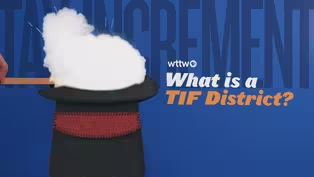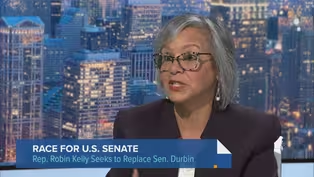
Lawmakers Want Some Illinois Community Colleges to Offer 4-Year Degrees
Clip: 5/12/2025 | 8m 8sVideo has Closed Captions
An effort is underway to offer four-year degrees as Illinois community colleges.
New legislation in Illinois aims to increase the rate of college grads by offering four-year degrees at community colleges.
Problems playing video? | Closed Captioning Feedback
Problems playing video? | Closed Captioning Feedback
Chicago Tonight is a local public television program presented by WTTW
WTTW video streaming support provided by members and sponsors.

Lawmakers Want Some Illinois Community Colleges to Offer 4-Year Degrees
Clip: 5/12/2025 | 8m 8sVideo has Closed Captions
New legislation in Illinois aims to increase the rate of college grads by offering four-year degrees at community colleges.
Problems playing video? | Closed Captioning Feedback
How to Watch Chicago Tonight
Chicago Tonight is available to stream on pbs.org and the free PBS App, available on iPhone, Apple TV, Android TV, Android smartphones, Amazon Fire TV, Amazon Fire Tablet, Roku, Samsung Smart TV, and Vizio.

WTTW News Explains
In this Emmy Award-winning series, WTTW News tackles your questions — big and small — about life in the Chicago area. Our video animations guide you through local government, city history, public utilities and everything in between.Providing Support for PBS.org
Learn Moreabout PBS online sponsorshipmajority of community college students say they plan to transfer to a four-year university 79% to be precise.
But only 35% successfully do.
That's according to research from the Partnership for College completion, which also found that only 20% of those students complete a bachelor's degree.
New legislation aims to increase those rates by offering four-year degrees at community colleges.
But critics say instead efforts should be made in improving the transfer process and our concern, it could cut into some university's enrollment.
Joining us with more is Jim Reed, executive director of the Illinois Community College Trustees Association.
We also invited a number of opponents of the bill, but they declined our request.
Jim Reid, thank you for being with us tonight.
We appreciate it.
All right.
Thank you for having for folks who might not be familiar with it, what does this legislation aimed to do?
>> really is about creating pathways for students giving them an opportunity to not only meet workforce needs, but also to fill their educational goals.
And so we find that there are a number of barriers that prevented students from doing so.
We have seen that this is working.
24 other states.
And so after researching this or almost nearly 6 years, we have caught up with legislation that we believe addresses some of those barriers and provides an opportunity for students who otherwise wouldn't be able to go on to public universities and go on to get those degrees to be able to do so meet their obligations at home in their communities.
>> Yeah, I mean, to your point about those barriers, how do you see this?
This potential change is helping to improve outcomes for students.
>> Well, if have to sort of look at what 3 burials are in really the most prominent ones are those around cost to go to public university or private university.
We have a number of places where we a bachelor's degree deserts.
Those are places where students do not have access to a public university.
And if they are available there substantial distance away and then the last Israeli in terms of timing mode or delivery, if you are a working parent, if you are first generation student and you want to get your bachelor's degree but you can't access geographically, this would give you an opportunity.
>> To stay in your community to continue to work.
Can feed your family to take care of your kids to get your degree in need in your community.
And we have found that the survey results, increase the number of students nearly 2400 and almost 80% of them say that they would >> pursue a bachelor's degree offered in their community.
So we believe that that provides an opportunity for them to their needs while addressing many of the workforce needs that are apparent in our communities.
Across the state of Illinois.
>> Yeah.
Their particular fields of study.
And to your point about those deserts, parts of the state where you think this change would be particularly beneficial.
>> it in terms of those specific workforce needs.
We've looked at sort of critical areas like nursing early childhood education, cybersecurity, manufacturing.
These are all areas that are struggling to find qualified town.
And so that's why the importance of legislation is really focused on workforce needs the the application process.
The community colleges would have to go through to meet those needs and be able to offer.
Those is very rigorous, but they're really, very narrowly focused.
It provides us to meet the needs of empty hospital beds that plagued our communities close classrooms, unfilled cybersecurity roles and manufacturing lines that are sitting idle.
So this is very narrowly tailored to address those needs in those communities.
>> Despite that tailoring, you know, a lot of four-year colleges and universities in Illinois opposed this idea.
They're obviously facing preexisting enrollment and financial challenges of their own.
Is there a way to prevent siphoning off students from those schools?
>> You know, I think we need to be very clear that the research shows that the students who attending their bachelor's degrees through the community colleges, states across the country are not traditional students.
They're not the 18 to 24 year-olds.
These are individuals are out of the workplace workplace that are looking increase their their ability to move in their workplace.
This is the 28 to 32 year-old student.
And so those are not the students that were competing with a year in against our public universities.
secondly, we look the statistics across the states.
You'll see that even those that have had community college backwards less than one percent of the degrees that are coming out of those states are coming from the Community.
College Baccalaureate.
>> The only exception to that would be Florida, which is about 8%.
And they've been around for more than 2 decades.
>> Well, as we mentioned, a report from the partnership for College completion found some 79% of students start off intending to transfer to a four-year school.
Just 35% do.
Those rates are even lower for students of color and low-income students.
And that report found just 20% graduate with a bachelor's, you know, is this legislation the right way to help improve those numbers?
Do you think that that could be one of the outcomes here?
>> It is certainly a way we would certainly encourage our traditional partnership programs.
We know that there are a lot of very constructive and complex programs that exist in a very successful the 2 plus 2 programs that 3 plus ones.
We think that those should continue But this is really about meeting the needs of those students that are going anywhere that are participating in those programs.
And again, its work force base.
We believe those students substantially benefit from having this kind of an option.
So it really overlap.
It's really about enhancing its not either or it's about having both of these and again in states that have implemented.
We've seen that kind of partnership.
We seen ongoing growth of the partnership.
But at the same time, we've also seen the growth of the baccalaureate would otherwise do not go anywhere, decide to go ahead and get their degree.
>> We've got about 30 seconds left.
But, you know, as I'm sure, you know, well, this has been a fairly hotly contested issue, rather in Springfield.
Do you think there is a way to to craft a compromise that that universities and lawmakers can get on board with?
>> Absolutely.
When we started this conversation nearly 6 years ago, but even a more recent past couple years, we've encouraged to the community, the public universities and community colleges to work together.
We believe we have legislation crafted now that provides an agreement deals with issues around to publications so that there are not duplication of services with the in their various regions in various parts of the there, sufficient caps to ensure that public universities can become comfortable with And I think the goal is to make sure that all students have an opportunity to achieve their full potential in terms of education.
We know that the public universities, the private universities and community colleges, all Iraq, that same goal.
So it's really been great under the leadership of the governor to make that happen and to bring us all together.
We think we're very close to making that a reality here in Illinois.
>> And I'm sure you will be keeping an eye on this closely as will we.
But that's all the
Video has Closed Captions
Clip: 5/12/2025 | 3m 36s | A look at how TIFs are used in Chicago and what they mean for your property taxes. (3m 36s)
U.S. Rep. Robin Kelly Hits the Trail in Campaign for Senate
Video has Closed Captions
Clip: 5/12/2025 | 8m 13s | U. S. Rep. Robin Kelly launches campaign to replace Dick Durbin in the Senate. (8m 13s)
Providing Support for PBS.org
Learn Moreabout PBS online sponsorshipSupport for PBS provided by:
Chicago Tonight is a local public television program presented by WTTW
WTTW video streaming support provided by members and sponsors.













